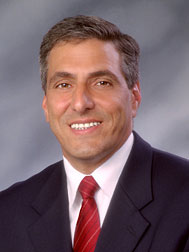Mayor Lou Barletta took the stand as a hostile witness for the plaintiffs in day 3 of the case against Hazleton, Pennsylvania's Illegal Immigration Relief Act (IIRA). The act - which punishes businesses who hire and landlord who rent to illegal aliens - has been challenged on its constitutionality by the ACLU, Puerto Rican Legal Defense Fund, illegal aliens and is supported by the US Chamber of Commerce and Catholic Bishops.
In total there are 25 plaintiff attorneys to 5 for Hazleton, showing just how much of a threat to illegal immigration and big business that this ordinance would be nationally if it is ruled constitutional.
And that's the crux of the matter - is it constitutional?
So far in day one and day two we have seen a constant argument that the ordinance wasn't researched, the city isn't currently organized to implement it, questions on crime statistics involving illegal aliens or that it could be detrimental to the economy and businesses in the city, but no arguments from the plaintiffs regarding the Acts constitutionality.

Mayor Lou Barletta |
Mayor Barletta was "questioned" by ACLU attorney Witold "Vic" Walczak who did most of the questioning on day one as well. "Questioning" is really a nice way of putting it as the questions were all of a hostile intent and there was verbal sparring between the two throughout the day.
In his opening statement Walczak called Mayor Barletta an opportunist, thus setting the tone for five hours of questioning.
Walczak dug into Barletta, questioning him on exactly how many illegal aliens are in Hazleton, which of course Barletta could not answer. Laws pushed through over the years by pro illegal alien groups, including the ACLU, have barred places like hospitals, schools and the police from actually asking individuals of their legal status in America. These laws were put in place by these groups so that the true statistics of the damage illegal immigration is having on this country cannot be tracked accurately, thus avoiding situations like the one they now find themselves of federal, state and local governments closing the flow of illegal immigration into this country.
"We usually find out someone is here illegally when a crime has been committed and then, unfortunately, it's too late," Barletta said. Barletta acknowledged that legal Hispanic immigrants into Hazleton have had some positive impacts on the city, but the illegal aliens are draining city resources and taxpayer funds by requiring things like overtime pay for police.

Vic Walczak, ACLU |
Walczak returned to the numbers again asking for figures on the number of crimes illegal aliens commit and how many illegal aliens are in the schools and hospitals. Basically he is asking the same questions as above. Questions he knows can't be answered due to current laws on the books.
Barletta said that as the population of the city has grown by 50%, revenue from taxes has remained flat, a fact which shows that many of these newcomers are not working or working "under the table" and not paying taxes.
Trying to make the point that illegal aliens add to the economy this exchange occurred.
The mayor became indignant when Walczak pointed out that illegal immigrants eat in restaurants, buy groceries and gas, purchase houses, and engage in other consumer spending that benefits city businesses and city government through sales taxes.
"So do other people who commit crimes," Barletta replied. "Do I condone illegal behavior because they buy gas or eat in someone's restaurant? I'm not one who believes that's OK."
A valid point by Barletta.
I am not sure why US district Judge James Munley is allowing this line of questioning to continue in the first place. It is irrelevant to the case which is centered on constitutionality, not on the economic impact of this act. The Hazleton attorneys should be objecting to every question that is not relevant to the case at hand rather than sitting back and allowing the ACLU and pro illegal alien proponents to grand stand and be "opportunists" as Walczak said of Barletta.
There was also some sparring over the term that should be used to describe illegal aliens. Walczak of course prefers to use "undocumented immigrant" and he asked Mayor Barletta if it was okay for him to use that term to which Barletta replied "You can use undocumented if you don't mind me using illegal alien,".
I personally would have told Walczak that no, it was not okay, since all of the federal laws on the books refer to them as illegal aliens and since the ACLU holds the federal authorities right to enforce immigration law so highly that they should use the proper legal term, but that's just me.
Outside, after court, Walczak produced new crime statistics he had requested from Hazleton and pointed out that crime has not increased out of proportion to the increase in population the city has seen over the years. A straw man argument, since those statistics are irrelevant to whether the ordinance is unconstitutional.
Out of 8,575 crimes in the six-year period, the city was only able to identify between 20 and 30 that involved illegal immigrants, he said, including only two or three of 212 rapes, robberies and homicides.
In my opinion that is 20 to 30 crimes that should have never occurred, since those who committed them should not have been in this country or Hazleton. Even one crime is unacceptable when you are the victim. If it had been Walczak's relative that had been the one murdered by an illegal alien would he be stating that only one murder was committed by an illegal alien?
Mayor Barletta will again take the stand tomorrow for questioning by Hazleton attorneys. The trial is expected to go on for two weeks, though I feel it could have been resolved by now if all questioning could have focused on the point of the case... is the ordinance constitutional?
Be sure to check out the recap of the other days of coverage in my Hazleton Archive
Hazleton needs funding. You can donate to their legal defense fund at Small Town Defenders. Their case could set the stage for reduced illegal immigration throughout this country, so donate today!
Sources:
AP: 1; Pittsburgh Post-Gazette 1

